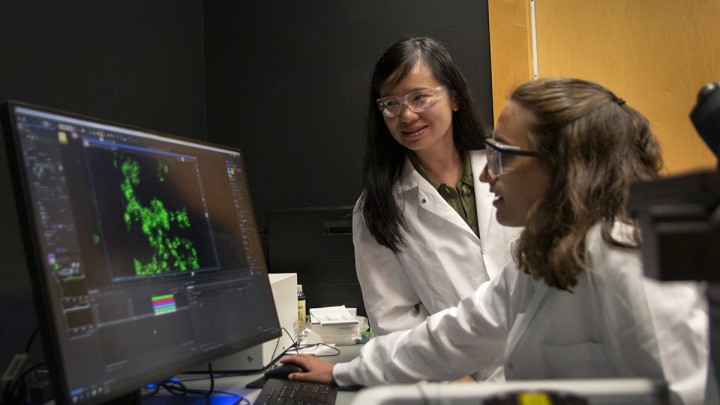
At the LSI, philanthropy is funding the foundation of innovative research: Our students
When I joined the LSI as an assistant professor in 2018, I set about the same tasks as any junior faculty member: setting up a new lab, building collaborative relationships with colleagues, and recruiting talented graduate students who were passionate about our group’s work in developing tools to understand neuronal activity.
In many ways, students are the most important part of any lab: Graduate and undergraduate students do the hard work of daily science and bring fresh perspectives to our research. Without dedicated students, research progress and discovery would happen much slower, or even never at all.
It might surprise anyone who isn’t familiar with the ins and outs of STEM graduate education at many major American universities, like U-M, that funding for graduate students is the responsibility of the lead scientist in the lab where the students spend their time conducting research. The U.S. system of competitive federal grants for scientific research allows us professors to pay the tuition of graduate students and to provide a stipend from grants—but in so many ways, this can be a real challenge, especially for a new professor. It takes a couple of years for a lab to begin to publish the papers that lead to grant funding. Once we begin to be funded on grants, we budget for lab staff, supplies, services—and students. With tuition increasing, we often face a choice between hiring a graduate student who needs to conduct research in order to complete their degree and launch their career, or hiring a technician or postdoctoral researcher with more experience. While we and our students can apply for fellowships from federal and foundation sources, there’s little a faculty member can do to change any of these real costs.
This is where the LSI’s student support funds have been critical. With the help of funds provided by donors, I’ve been able to support some students even when my lab funding was low.
The LSI provides support for one graduate student per year—and this enables labs like mine to support one additional student, keep a student even when grant funds are not abundant or relieve a student from teaching assistant obligations for a semester. In my lab, for example, I was able to fund graduate student Kayla Kroning in the Winter 2021 term so she could focus on research. During that time, she completed what would become the first research paper from our lab, which was published in Angew Chem Int Ed. Also during that semester, Kayla also applied for and received a federal grant known as F31 to cover her own tuition and stipend. This is just one example of how LSI’s philanthropic graduate student support funds help individual students as well as the lab as a whole.
A few years ago, the LSI also began offering a personal award to graduate students and postdocs who received external funding like Kayla’s F31. Like the LSI’s tuition funding, an external fellowship relieves the faculty member from paying tuition and stipends—thus allowing more grant funding to be used for research. This is tremendously beneficial to me as a PI and to the rest of my lab, and the application process is beneficial for the student’s professional development; but the students did not get any personal monetary award from the fellowship itself, until the LSI established this award.
The award recognizes the amount of work that goes into applications for graduate student and postdoctoral fellowships. The bonus encourages more trainees to pursue external fellowships and celebrates their achievement, showing them that all that hard work and accomplishment is appreciated. The monetary award is not the biggest motivating factor to apply for the graduate student fellowships, but each student is always very happy to receive the note from LSI regarding the monetary award. And as this fund, like the tuition money, comes from generous donors, I’d like to recognize and thank these individuals for making gifts to the LSI that help us all in this way.
Beyond experiences conducting research in the lab, trainees also need opportunities to attend scientific conferences and meetings. These conferences are essential for the student’s professional development, allowing them to present their research and meet scientists from around the world. Attending conferences is also one of the very fun things to do as a scientist—to travel, make friends and enjoy science together—and this boosts the students’ and postdocs’ morale and enthusiasm for science.
At the LSI, our trainees have access to funds that support these opportunities: The David and Michelle Kroin awards for conference travel enables students and postdocs to participate in the primary way we scientists exchange new ideas, build research relationships and explore new ideas. That trainees my lab can access this support independently, regardless of my success in obtaining grant funding, is tremendous for their independence.
When I joined the LSI, I was unaware of just how unusual this kind of support is, or that it’s donors who must make it possible. The impact is wide and critical both for my growing lab and for the development of these future scientific leaders.


